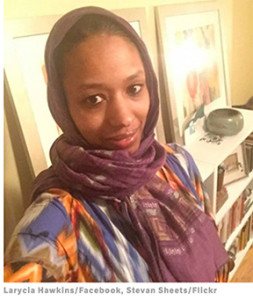by Daniel Martin Varisco, MENA Tidningen
As an undergraduate I attended Wheaton College in Illinois, an interdenominational evangelical Protestant enclave, from which I obtained a quality education. Although not a “Bible Schoolâ€, there was a pledge which promoted the conservative values and rules that evangelicals are known for. Wheaton is in the news now for censuring a tenured professor of Political Science, who chose to wear a hijab as a sign of solidarity with Muslims, whose faith is under attack in the Islamophobic rhetoric of the Republican presidential circus.
Her name is Larycia Hawkins, one of the very few African-American professors at this conservative college. The college administration claims that she has not been placed on administrative leave because she wore a hijab, but rather because of the “significant questions regarding the theological implications” of her reason for doing so. Her reason was one of solidarity with Muslims who are being targeted because of their faith, noting that Muslims are “People of the Book.†It is obviously that it was her use of an Islamic phrase that upset the rule mongers in the administration. But then does this mean that Jews do not worship the same God? What about Catholics or Orthodox or Mormons? The problem that the extreme edges of evangelical theology needs to overcome is the idea that only the “Bible Believers†are true Christians. Wheaton used to be better than that.
The idea of “People of the Book†is hardly any different in scope than the common phrase of “Abrahamic religions,†one that even Baptist Jimmy Carter used. It is absurd to argue that the three major monotheisms, as well as their spinoffs dismissed as heresies, do not refer to the same God said to have created the world and sent a series of prophets. Of course they do. So the issue becomes one of which view of God is seen as “correct†or at least allowed. Christians have killed other Christians over this and so have Muslims. The current Sunni/Shi’a divide exacerbated by the rhetorical and proxy war clash of Saudi Arabia and Iran as well as the ISIS extremism show how fellow Muslims can be considered as worse enemies than members of other religions. Those killed by one group or another in the name of the same “God†would fill up every cemetery on the planet and then some.
The Islamic faith, as expressed in the Quran and preached by the prophet Muhammad, came to revise rather than replace the earlier monotheisms of Judaism and Christianity. All three religions were characterized as “People of the Book.†The verse in Surah 29:46 (al-Ankabut) makes it clear that all three faiths worship the same God: “Do not argue with the People of the Book except only by the best manner, except the unjust among them. Tell them, “We believe in what is revealed to us and to you. Our Lord and your Lord is one. We have submitted ourselves to His will” (translation by Muhammad Sarwar). The books in question are the Torah of Judaism, the Gospel of Christianity and the Quran; Moses and Jesus are recognized as prophets sent by the one God to humanity. Although the Quran is praised as correcting the errors in interpreting the earlier revelations, there is not supposed to be forced conversion to Islam from the other two faiths (Surah 2:256, al-Baqara). The interpretation of what would seem a straight-forward statement has at times ignored the sense of no compulsion, but even Sayyid Qutb noted that “Freedom of belief is the most basic right that identifies man as a human being. To deny anyone this right is to deny him or her humanity.â€
Ideally, then, Jews and Christians are free to practice their faith, even though they should recognize the error of their ways when they read the Quran. Christianity, for the most part, has viewed itself in the same way as correcting the earlier faith of Judaism. Jesus was, after all, a Jew. The New Testament, and indeed many of the sayings attributed to Jesus, draws on Old Testament characters rather than starting a new religion from scratch. Christian apocalyptics also suggest that one day Jews will recognize that Jesus was the Messiah. When Islam first came along, it was seen by early Christians as a heresy rather than a new religion. The theological issue today, however, is less about a specific view of God being a heresy than the issue of whether one believes in the single God reflected in all three scriptures or one is an atheist (or idolater). This is compounded when it is assumed that worshipping the same God in a different way is no different than being an atheist or is even worse.
Dr. Hawkins is a victim of theological tunnel vision, the idea that a moral stand is less important than some doctrinal bullet point. Of all people, Christians who appreciate the history of their faith should recognize the danger of the hatred that is targeted at a person because of their faith. Count the martyrs in the history of Christianity. Hawkins was not advocating that she or her students become Muslims, but acting out of her view of Christian love. The Jesus who said love your enemies (Matthew 5:24; Luke 6:27-36) seems to have been lost by those who would censor this act of love. So is it a Christian virtue to say nothing when others are persecuted because of their faith? To dwell on the issue of which book to follow is to miss the point of a message shared by Jesus and John Lennon: All you need is love.
___
Daniel Martin Varisco is President of the American Institute for Yemeni Studies, Research Professor at Qatar University and advisor to MENA Tidningen.
